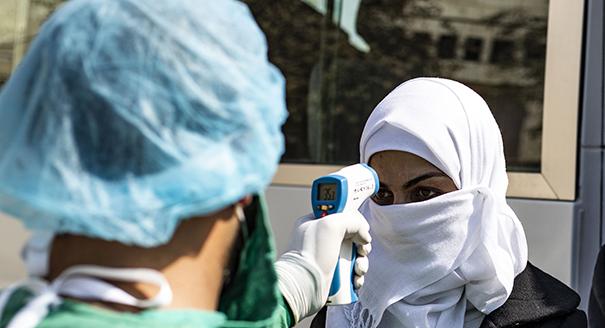It is only natural that the world is focused on short-term measures to battle Covid-19. However, few countries, if any, have the capacity or appetite to start thinking about ways to deal with the long-term impact of the disease. These are bound to be major. Already we are hearing estimates of an enormous 11 percent contraction in the global economy, the loss of more than 25 million jobs, a permanent reduction of 2–3 percent in global GDP, and the list goes on.
The Arab world is no different. But the crisis has come at a time when the Middle East and North Africa is already suffering from very serious economic and social challenges. This is the third major wave that has hit the region in the last decade—the first two being the Arab uprisings which began in 2011 and the decline in oil prices starting in 2014. The latter marked the beginning of the end of the rentier era, when countries relied on oil for economic growth and social peace. Three such waves in one decade can have catastrophic consequences unless their effects are properly addressed.
Few countries in the region have the financial space to provide serious fiscal stimulus packages. Gone also are the days when oil revenues were used by Gulf states to bail out countries of the region that were in trouble. Oil prices, which have declined from $140 a barrel in 2014 to about $25 today, mean, practically, that non-oil producing countries are on their own, unable to rely on Gulf largesse, having to compete for global resources with other countries in the world.
Whether it is weeks or months down the road, all Arab countries, like everyone else, will have develop medium-term plans to deal with the aftermath. Unemployment, already double the world’s average, will skyrocket. Many small and medium enterprises will go out of business. The weakest sectors of the population will be hit hard. And any economic plans to deal with this and attempt to bring economies back to a semblance of normalcy will take time and involve very serious economic sacrifices that will be borne by average citizens.
If there is a time in the Arab world for political reform that restores some of the trust gap between citizens and their states, it is now. The old tools of governance, in which governments decide and people are expected to acquiesce will not work. The central question that has to be addressed today by Arab governments is not whether they are capable of producing economic plans. They clearly are. Rather, it is whether any of these plans will be accepted and implemented by their citizens, or whether they will lead only to social unrest.
That is why those who are affected most by the crisis, namely the citizens of Arab societies, have to be brought into the formulation of such plans. What they bring to the table is not necessarily technical expertise, but rather a sense that by being consulted they are, in fact, a part of the solution. This is a crucial element needed for the widespread buy-in by Arab populations.
Jordan went through a telling experience in the late 1980s, when it was hit by a severe economic crisis that resulted in Jordanians losing half of their net worth almost overnight. Financial help from the Gulf states was not forthcoming, and no economic plan was able to provide overnight relief. The late King Hussein’s solution involved a strong political component. He organized the first general and free elections in 30 years, resulting in a parliament that Jordanians felt was representative; and he established a national committee to write a new social contract for the country. The result was miraculous. Despite serious economic hardships for years afterward, social peace was maintained because of such inclusiveness and the people’s trust in successive governments.
As Arab countries struggle to put themselves back on track, concepts such as trust and inclusiveness can no longer be viewed as the brainchild of political elites that are out of touch with their societies. These concepts are crucial for any recovery. Absent that, the Arab world has to brace itself for a very difficult period ahead.
It is understandable that the historical record stands against such arguments. These concepts have rarely been part of the governance toolbox in the region. But the world has changed. The old ways adopted in the region—security measures and financial resources to keep social peace—are no longer there. Covid-19 might provide an excellent opportunity for a new start, one where good governance and the public’s participation in it lead to necessary revivals.








